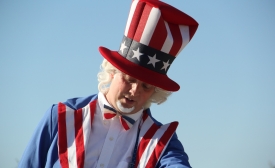foreign policy
Russian president Vladimir Putin has reiterated some aspects of Russia's foreign policy agenda with Africa in speech delivered on November 9, when receiving letters of credence from new foreign ambassadors including six from Africa. The six new African ambassadors are from Burundi, Chad, Equatorial Guinea, Gambia, Mali and Somalia.
May’s focus was on the need to ensure that the benefits of "liberalism and globalisation" are more evenly distributed. For her, the EU referendum and the US presidential election should be read as wake-up call. Important as this analysis may be for electoral politics, it does not set out a clear road map for the UK’s future foreign policy.
That Mr. Duterte’s contribution to international statecraft, the annals of which already include Ping-Pong diplomacy, would include karaoke might come as little surprise to those he leads. [...] Karaoke bars are an essential part of social life in the Philippines, and virtually every home in the country has a karaoke machine. A passion for public singing has led to competitive television shows, a multimillion-dollar business of migrant worker entertainers and several murders.
As Korean scrambles to build diplomatic links from scratch with a Donald J. Trump administration, Japanese Prime Minister Shinzo Abe moved swiftly to schedule a summit with the U.S. president-elect in New York next week. While Korean President Park Geun-hye spoke over the phone with Trump for about 10 minutes Thursday to reaffirm his support for the U.S.-Korea alliance, Abe and Trump held a 20-minute phone conversation and agreed to meet on Nov. 17.
Despite Trump’s campaign rhetoric, the US is not in decline. Because of immigration, it is the only major developed country that will not suffer a demographic decline by mid-century; its dependence on energy imports is diminishing rather than rising; it is at the forefront of the major technologies (bio, nano, information) that will shape this century; and its universities dominate the world league tables.

America is not as polarized as we fear.
President Rouhani touched upon critical issues of the press and the crackdown targeting the ‘mouths and pens’ based on unfounded evidence; he believed that the media’s foremost responsibility was to promote peace of mind for the public, since “in a society of severe perturbation and tumult, terrorism and extremism would find favorable grounds to be fostered







